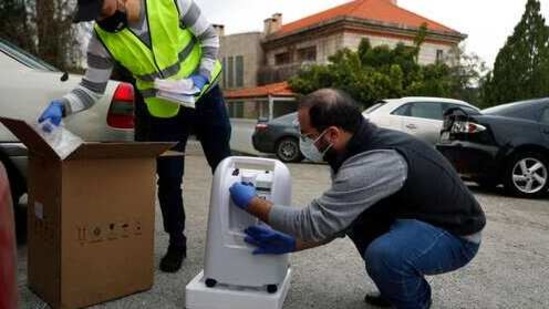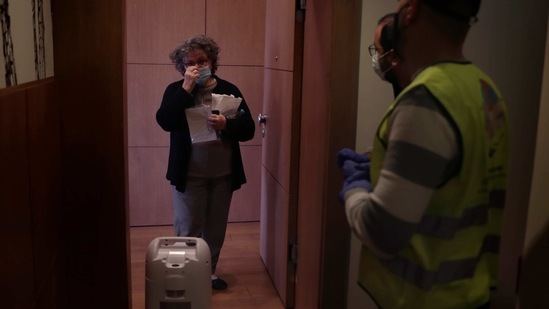Home away from home: Lebanese group extends help to health workers
Raising more than $27,000, the group currently have placed 48 machines with those who need it across the country.
In the middle of the destroyed Beirut neighborhood of Gemmayzeh, a small team in masks and gloves were sanitizing and packing oxygen machines to be sent to those in need.

It’s the latest venture of a Lebanese civil group that arose with the coronavirus pandemic and has been finding new avenues to help as the country’s crises expand.
“No one is exempt from COVID. Nobody. Nobody has super-power immunity,” said Melissa Fathallah, one of the founders of Baytna Baytak, Arabic for Our Home is Your Home.
“We saw that our own relatives and our colleagues are suffering with this, we decided, okay, we are going to start another fundraiser and to specifically focus on the oxygen machines.”
Raising more than $27,000, they currently have placed 48 machines with those who need it across the country.
Baytna Baytak, with 110 staffers, launched at the start of the pandemic with a very different initiative: Finding a home away from home for front-line workers who were worried about exposing their families to the virus. During Lebanon’s first lockdown in March, they housed 750 front-line workers in various apartments.
Chloe Ghosh, a 26-year-old medical resident at a government hospital in Beirut, has been living in accommodations provided by the group since the start of the pandemic.

Her family is from Tannourine, a small town 80 kilometers (50 miles) north of Lebanon. For her, putting her family at risk was another burden she couldn’t fathom.
“If I got COVID or anyone my age got COVID, we could survive,” Ghosh said. “But our families, no.”
Her first accommodation with the group was wrecked when another disaster struck Beirut, the massive Aug. 4 explosion at the city’s port. The blast killed more than 200 people, injured 6,000 others and destroyed thousands of homes.
Ghosh was unharmed. She moved to another place provided by Baytna Baytak across town in Hamra street. She now shares a four-bedroom apartment with three other medical workers who work in different hospitals around the city.
On a recent afternoon, Gosh and one her apartment mates, Issa Tannous, were decompressing after a long day, sipping a cup of coffee in front of the lights strung across the apartment’s windows. It was a rare instance when they were home at the same time.
“At the end of the day, someone cared for us,” said Tannous, a 28-year-old medical resident at private hospital. “Someone appreciated what you are going through and all that is going through our heads. It gave us space not to be afraid, not to worry that we might actually hurt someone.”
The apartment was donated to Baytna Baytak by a philanthropist to help accommodate the front-line workers. The same donor gave several other properties around Beirut for the same purpose.
After the port explosion, Baytna Baytak rushed to expand its efforts to help those whose homes had been shattered. It placed them in temporary housing while it helped raise funds to fix their homes. Within the first 24 hours of the call for housing, they had six apartments donated.
Baytna Baytak grew out a lack of services provided for front-line workers in Lebanon, Fathallah said.
“As far as the government is concerned, we don’t have a government. Let’s just get that out of the way,” she said. “If we actually want to acknowledge their existence, then they are a completely failed government in every which way possible.”
Lebanon’s health sector is overworked and stretched thin, even more so after the explosion.
Doctors are working multiple shifts a day to cover for colleagues infected with the virus. More than 2,300 Lebanese health care workers have been infected since February, according to the Order of Physicians.
Lebanon has over 14,000 medical doctors and 17,000 nurses, but many doctors have also left the country, reeling from a crippling economic crisis that preceded the pandemic.
After the explosion, Lebanon saw a major surge in COVID-19 infections that only worsened by the end of 2020, forcing Baytna Baytak to put some of its work on hold. Donors also were fewer.
Currently, they have 100 front-line workers placed in six apartments, a few hotels and a Covent.
Still, the group has continued to work amid a 24-hour lockdown that started mid-January. Even while distributing oxygen machines, the team was getting fined for violating curfew.
Fathallah is determined to keep going.
“We took it upon ourselves because of the greater good, because of the bigger picture because of the country and the citizens. We took it upon ourselves.”
Get Latest Updates on Trending News Viral Video, Photos from India and around the world



